a.
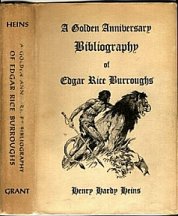
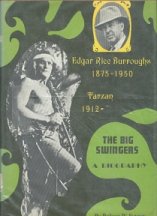
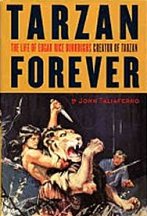
Erwin Porges' ground breaking biography: Edgar Rice
Burroughs: The Man Who Invented Tarzan is the basic source for the
course of ERB's life. John Taliaferro's
Tarzan Forever is
heavily indebted to Porges adding very little new. Robert Fenton's
excellent The Big Swinger is a brilliant extrapolation of Burroughs'
life taken from the evidence of the Tarzan series.
Porges, the first to pore through the unorganized
Tarzana archives is limited by the inadequacies of his method and his deference
for his subject. His is an ideal Burroughs rather than a flesh and
blood one. Matt Cohen's Brother Men: The Correspondence of Edgar
Rice Burroughs and Herbert T. Weston has provided much fresh material
concerning ERB's character.
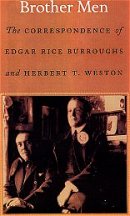 Bearing in mind always that Weston's evaluation of Burroughs in his August
1934 letter in reply to Charles Rosenberg, whoever he was, about ERB's
divorce is one man's opinion nevertheless his statements can be corroborated
by ERB's behavior over this decade as well as throughout his life.
My intent is not to diminish ERB in any way. Nothing can take away
the fact that Burroughs created Tarzan, but like anyone else he was subjected
to glacial pressures which distorted and metaphosed his character.
Bearing in mind always that Weston's evaluation of Burroughs in his August
1934 letter in reply to Charles Rosenberg, whoever he was, about ERB's
divorce is one man's opinion nevertheless his statements can be corroborated
by ERB's behavior over this decade as well as throughout his life.
My intent is not to diminish ERB in any way. Nothing can take away
the fact that Burroughs created Tarzan, but like anyone else he was subjected
to glacial pressures which distorted and metaphosed his character.
During the second decade as he experienced
a realization of who he was, or who he had always thought he was, or, in
other words, as he evolved back from a pauper to a prince, he was subjected
to excruciatingly difficult changes.
A key to his character in this period is his
relationship to his marriage. It seems clear that he probably would
never have married, stringing Emma along until she entered spinsterhood
while never marrying her. He seemingly married her to keep her away
from Frank Martin. As he later said of Tarzan, the ape man should
never have married.
Rosenberg in his letter to Weston (p.234, Brother
Men) said that '...Ed says he has always wanted to get rid of Emma...'
The evidence seems to indicate this. After ERB lost Emma's confidence
in Idaho gambling away the couple's only financial resources his marriage
must have become extremely abhorrent to him. I'm sure that after
the humiliations of Salt Lake City this marriage had ended for him in his
mind. That it was his own fault changes nothing. He may simply
have transferred his self-loathing to Emma.
That Emma loved and stood by Burroughs is evident.
That he was unable to regain her confidence is clear from his writing.
The final Tarzan novels of the decade in one of which, Tarzan The Untamed,
Burroughs burns Jane into a charred mess identifiable only by her jewelry.
Probably the jewelry ERB hocked as the decade turned. Now, this is
a fairly violent reaction.
ERB states that he walked out on Emma several
times. In Fenton's extrapolation of Burroughs' life from his Tarzan
novels this period was undoubtedly one of those times. There
seems to have been a reconciliation between Tarzan and Jane between
Tarzan
The Untamed and Tarzan
The Terrible. Then between
Tarzan
And The Golden Lion and Tarzan
And The Ant Men ERB's attempt to regain Emma's confidence seems
to have failed as Jane chooses the clown Tarzan - Esteban Miranda, one
of my favorite characters- over the heroic Tarzan - ERB - in Tarzan
And The Ant Men.
This undoubtedly began ERB's search for a Flapper
wife which took form in the person of Florence
Gilbert beginning in 1927.
b.
Weston says of ERB in his disappointment and
rage over ERB's divorce of Emma that '...the fact that Ed always has been
unusual, erratic and perhaps queer, has been his great charm and attraction
for me...' (p. 233, Brother Men) There's a remote possibility
that 'queer' may mean homosexual but I suppose he means 'odd' or incomprehensible
in his actions. The evidence for this aspect of ERB's character is
overwhelming while being well evidenced by his strange, spectacular and
wonderful antics during this second decade. When Weston says of him
that '...there is no woman on earth that would have lived with him, and
put up with him, except Emma...' there is plenty of reason to accept Weston's
opinion.
Part of ERB's glacial overburden came from
his father George T. who died on February 13, 1913. Burroughs always
professed great love for his father, celebrating his birthday every year
of his life, although one wonders why.
Apparently George T. broadcast to the world
that he thought ERB was 'no good.' His opinion could have been no
secret to Burroughs. Weston who says that he always maintained cordial
relations with George T., still thinking him a difficult man, always dropped
in to see him on trips through Chicago said that George T. complained to
him, ERB's best friend, that his son was no good. While without disagreeing
with him that up to that point ERB had been no good, he thought there
was plenty of good in ERB but he just hadn't shown it yet. Kind of
a back handed compliment, reminds me of Clarence Darrow's defense of Big
Bill Haywood: Yeah, he did it, but who wouldn't?
Such an opinion held by one's father is sure
to have a scarring effect on ones' character. How exactly the effect
of this scarring worked itself out during this decade isn't clear to me.
Perhaps Burroughs' mid-year flight to California shortly after his father's
death was ERB's attempt to escape his father's influence. Perhaps
his 1916 flight was the same while his move to California in 1919 was the
culmination of his distancing from his father. That is mere conjecture
at this point.
Now, what appears erratic from outside follows
an inner logic in the subject's mind unifying his actions. What's
important to the subject is not what observers think should be important.
c.
The scholars of the Burroughs
Bulletin,
ERBzine
and ERBList have also added
much with additional niggardly releases of material by Danton
Burroughs at the Tarzana archives.
One of the more valuable additions to our knowledge has been Bill Hillman's
monumental compilation of the books in ERB's
library.
Let's take a look at the library. It
was important to ERB; a key to his identity. Books do furnish a mind,
as has been said, so in that light in examining his library we examine
the furnishing of his mind. The shelves formed an important backdrop
to his office with his desk squarely in front of the shelves. ERB
is seated proudly at the desk with his books behind him.
How much of the library survived and how much
was lost isn't known at this time. Hillman lists over a thousand
titles. Not that many, really. The library seems to be a working
library. There are not the long rows of matching sets by standard
authors. The evidence is that Burroughs actually read each and every one
of these books. They found their way into the pages of his books
in one fictionalized form or another. Oddly authors who we know influenced
him greatly like London,
Haggard and Doyle are not represented.
Most of the works of these authors were released
before 1911 when Burroughs was short of the ready. Unless those books
were lost he never filled in his favorites of those years. That strikes
me as a little odd.
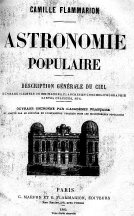
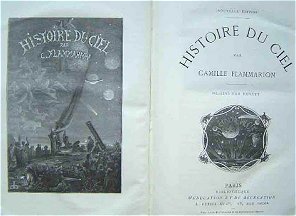
It is generally assumed that he picked up his Martian
information from Lowell, yet in Skeleton
Men Of Jupiter he says '...I believed with Flammarion that Mars
was habitable and inhabited; then a newer and more reputable school of
scientists convinced me it was neither....' The statement shows that
Camille
Flammarion's nineteenth century book was the basis for Burroughs' vision
of Mars while Lowell was not. Further having committed himself
to Flammarion's vision he was compelled to stick to it after he had been
convinced otherwise. When that understanding was obtained by him
we don't know but at sometime he realized that the early Martian stories
were based on a false premise.
Thus, his Mars became a true fiction when his
restless, searching mind was compelled by judicious reasoning of new material
to alter his opinion. That he could change his mind so late in life
is an important fact. It means that behind his fantasy was a knowledge
of solid current fact. The results of his pen came from a superior
mind. It was not the maundering of an illiterate but amusing boob.
Organizing the books of his library into a
coherent pattern is difficult. I haven't and I imagine few if any
have read all his list. Based on my preliminary examination certain
patterns can be found. He appeared to follow the Chicago novel by
whomever, Edna Ferber's
So
Big is a case in point. Seemingly unrelated titles can be grouped
around certain Burroughs titles as influences.
In 1924 when Marcia was written ERB
had already formed his intention of leaving, or getting rid, of Emma.
He began a fascination with Flappers that would result in his liaison with
Florence.
After the move to Hollywood in 1919 a number
of sex and Flapper potboilers find their way into his library. The
tenor of literature changed greatly after the War showing a sexual explicitness
that was not there prior to the Big Event. To be sure the graphic
descriptions of the sex act current in contemporary literature was not
permissible but the yearning to do so was certainly there. Language
was restrained but 'damn' began to replace 'd--n' and a daring goddamn
became less than a rarity.
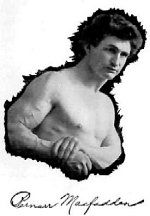 Perhaps the vanguard of the change came in 1919 when an event of great
literary and cultural import took place. Bernarr
Macfadden whose health and fitness regimes had very likely influenced
Burroughs during the first couple decades decided to publish a magazine
called "True Story." The magazine was the forerunner of the Romance
pulp genre while certainly being in the van of what would become the Romance
genre of current literature.
Perhaps the vanguard of the change came in 1919 when an event of great
literary and cultural import took place. Bernarr
Macfadden whose health and fitness regimes had very likely influenced
Burroughs during the first couple decades decided to publish a magazine
called "True Story." The magazine was the forerunner of the Romance
pulp genre while certainly being in the van of what would become the Romance
genre of current literature.
The advance was definitely low brow, not to
say vulgar, indicating the direction of subsequent societal development
including the lifting of pornographic censorship. Pornography followed
from "True Story" like night follows day.
The magazine coincided with the emergence of
the Flapper as the feminine ideal of the twenties. In literature
this was abetted by the emergence in literary fiction of F.
Scott Fitzgerald. His Beautiful And The Damned is a key
volume in Burroughs' library forming an essential part of Marcia.
to my taste Fitzgerald is little more than a high quality pulp writer like
Burroughs. I can't see the fuss about him. He reminds me of
Charles Jackson's
The Lost Weekend, or vice versa. In fact,
I think Jackson mined the Beautiful And The Damned. Plagiarizing
would be too strong a word.
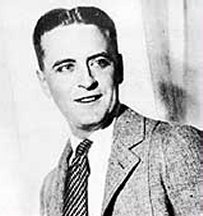
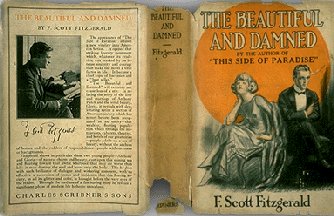
"True Story" caught on like a flash.
By 1923 the magazine was selling 300,000 copies an issue; by 1926, 2,000,000.
Low brow was on the way in. Vulgarity wouldn't be too strong a word.
Macfadden had added titles such as "True Romances" and "Dream World" to
his stable. His magazine sales pushed him far ahead of the previous
leader, Hearst Publications, and other publishers. Pulpdom had arrived
in a big way.
Where Macfadden rushed in others were sure
to follow. The sex thriller, the stories of willful and wayward women,
which weren't possible before, became a staple of the twenties is both
books and movies.
ERB's own The
Girl From Hollywood published in magazine form in 1922, book
form in 1923 might be considered his attempt at entering the genre.
Perhaps if he had thrown in a few Flapper references and changed the appearance
and character of his female leads he might have created a seamless transition
from the nineteenth century to the twenties. A few Flapper terms
might have boomed his sales much as when Carl Perkins substituted 'go,
cat, go' for 'go, man, go' in his Blue Suede Shoes and made converts
of all us fifties types.
Certainly ERB's
library shows a decided interest in the genre from 1920 to 1930.
Whether the interest was purely professional, an attempt to keep up with
the times, or personal in the sense of his unhappiness in his marriage
may be open to question. I would have to reread his production of
these years with the New Woman in mind to seek a balance.
Still, during this period that led up to his
affair with Florence ERB seems to have been an avid reader of Flapper and
New Woman novels.
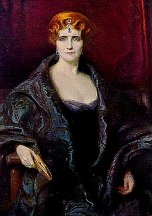
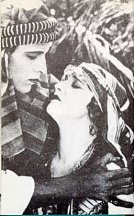 He had a number of novels by Elinor
Glyn who was the model of the early sex romance. He had a copy
of E.M. Hull's
The
Sheik, that later became the movie starring Rudolph Valentino with
its passionate sex scenes. A 'Sheik' became the male synonym for
Elinor Glyn's 'It' girl.
He had a number of novels by Elinor
Glyn who was the model of the early sex romance. He had a copy
of E.M. Hull's
The
Sheik, that later became the movie starring Rudolph Valentino with
its passionate sex scenes. A 'Sheik' became the male synonym for
Elinor Glyn's 'It' girl.
Of course, the influence of Warner
Fabian's
Flaming Youth of 1923, both book and movie, on ERB
is quite obvious.
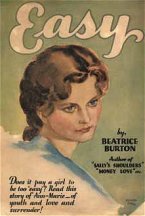 Just prior to his relationship with Florence he read a number of novels
by Beatrice Burton with
such sexy titles as
The Flapper Wife- The Story Of A Jazz Bride,
Footloose,
Her
Man, Love Bound and Easy published from 1925 to 1930.
Just prior to his relationship with Florence he read a number of novels
by Beatrice Burton with
such sexy titles as
The Flapper Wife- The Story Of A Jazz Bride,
Footloose,
Her
Man, Love Bound and Easy published from 1925 to 1930.
I would like to concentrate on Burton's novels
for a couple reasons; not least because of the number of her novels in
ERB's library but that when Burroughs sought publication for his low brow
Tarzan in 1913-14 he was coldly rebuffed even after the success of his
newspaper serializations. The disdain of the entire publishing industry
was undoubtedly because Burroughs was the pioneer of a new form of literature.
In its way the publication of Tarzan was the prototype on which Macfadden
could base "True Story." Not that he might not have done it anyway
but the trail was already trampled down for him. In 1914 Burroughs
violated all the canons of 'polite' or high brow literature.
A.L. Burt accepted Tarzan Of The Apes
for mass market publication reluctantly and only after guarantees for indemnification
against loss. Now at the time of Beatrice Burton's low brow Romance
genre novels, which were previously serialized in newspapers, Grosset and
Dunlap sought out the stories publishing them in cheap editions without
having been first published as full priced books much as Gold Seal in the
fifties would publish paperback 'originals' which had never been in hard
cover. Writers like Burton benefited from the pioneering efforts
of Burroughs. G&D wasn't going to be left behind again.
Apparently by the mid-twenties profits were more important than cultural
correctness.
As ERB had several Burton volumes in his library
it might not hurt to give a thumbnail of who she was. Needless to
say I had never read or even heard of her before getting interested in
Burroughs and his Flapper fixation. One must also believe that Elinor
Glyn volumes in ERB's library dating as early as 1902 were purchased in
the twenties as I can't believe ERB was reading this soft of thing as a
young man. Turns out that our Man's acumen was as usual very sharp.
Not that Burton's novels are literary masterpieces but she has a following
amongst those interested in the Romance genre. The novels have a
crude literary vigor which are extremely focused and to the point.
This is no frills story telling. The woman could pop them out at
the rate of two or three a year, too.
Her books are apparently sought after; fine
firsts with dust jackets go for a hundred dollars or more. While
that isn't particularly high it is more than the casual reader wants to
pay. Might be a good investment though. The copies I bought
ran from fifteen to twenty dollars, which is high for what is usually filed
in the nostalgia section. Love Bound was forty. I bought the
last but it was more than I wanted to pay just for research purposes.
There is little biographical information about Burton
available. I have been able to piece together that she was born in
1894. No death date has been recorded as of postings to the internet
so she must have been alive at the last posting which would have made her
a hundred at least.
She is also known as Beatrice Burton Morgan.
She was an actress who signed a contract with David Belasco in 1909 which
would have made her fifteen or sixteen. Her stage name may have been
Beatrice Morgan. The New York Public Library has several contracts
c. 1919 in her papers.
One conjectures that her stage and film career
was going nowhere. In The Flapper Wife she disparages Ziegfeld
as Ginfeld the producer of famous follies.
Casting about for alternatives in the arts
she very likely noticed the opening in sex novels created by Macfadden
and the Roaring Twenties. The Flapper Wife seems to have been
her first novel in 1925. The book may possibly have been in response
to Warner Fabian/Samuel Hopkins Adams' Flaming Youth.
As a motto for his book he had 'Those who know,
don't tell, those who tell, don't know.' The motto referred to the
true state of mind of women. Burton seems to have taken up the challenge-
knows all and tells all. Flapper Wife was an immediate popular
success when taken from the paper by G&D. Critics don't sign
checks so while their opinion is noted it is irrelevant.
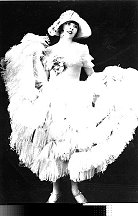 Burton apparently hit it big as the movies came after her. Flapper
Wife was made into a movie in 1926 titled His
Jazz Bride. Burton now had a place in Hollywood. Burroughs
undoubtedly also saw the movie.
Burton apparently hit it big as the movies came after her. Flapper
Wife was made into a movie in 1926 titled His
Jazz Bride. Burton now had a place in Hollywood. Burroughs
undoubtedly also saw the movie.
What success Burton's later life held awaits
further research. As there is no record of her death on the internet
it is safe to assume that when her copyrights were renewed in the fifties
it was by herself.
There are a number of titles in the library
having to do with the Flapper. The library, then gives a sense of
direction to ERB's mental changes. There are, of course, the Indian
and Western volumes that prepared his way for novels in those genres.
As always his off the top of his head style is backed by sound scholarship.
The uses of the various travel volumes, African
and Southeast Asian titles are self-evident. I have already reviewed
certain titles as they applied to Burroughs' work; this essay involves
more titles and I hope to relate other titles in the future. So the
library can be a guide to Burroughs' inner changes as he develops and matures
over the years.
The amount of material available to interpret
ERB's life has expanded greatly since Porges' groundbreaking biography.
Much more work remains to be done.
The second decade is especially important for
ERB's mental changes as his first couple dozen stories were written beginning
in 1911. Moreso than most writers, and perhaps more obviously Burroughs
work was autobiographical in method. As he put it in 1931's Tarzan
The Invincible he 'highly fictionalized' his details. For instance,
the Great War exercised him greatly. From 1914 to the end of the
War five published novels incorporate war details into the narrative: Mad
King II, Beyond
Thirty, Land
That Time Forgot,
Tarzan
The Untamed and Tarzan
The Terrible as well as unpublished works like The
Little Door. Yet I don't think the extent that the War troubled
him is recognized. The man was a serious political writer.
Thus, between the known facts and his stories a fairly
coherent life of Burroughs can be written. My essays here on the
ERBzine
can be arranged in chronological order to give a rough idea of what my
finished biography will be like.
Burroughs was a complex man with a couple fixed
ideas. One was his desire to be a successful businessman. The
fixed obsession almost ruined him. He was essentially a self-obsessed
artist and as such had no business skills although he squandered untold
amounts of time and energy which might better have been applied to
his art than in attempts to be a business success.
In many ways he was trying to justify his failure
to be a business success by the time he was thirty rather than making the
change to his new status as an artist.
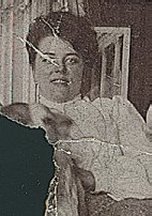 As a successful artist he was presented with challenges that had nothing
to do with his former life. These were all new challenges for which
he had no experience to guide him while he was too impetuous to sit down
and think them out properly. Not that all that many in his situation
do. Between magazine sales, book publishing and the movies he really
should have had a business manager as an intermediary. Perhaps Emma
might have been able to function in that capacity much as H.G. Wells'
wife, Jane, did for him. At any rate book and movie negotiations
diverted time and energy from his true purpose, writing.
As a successful artist he was presented with challenges that had nothing
to do with his former life. These were all new challenges for which
he had no experience to guide him while he was too impetuous to sit down
and think them out properly. Not that all that many in his situation
do. Between magazine sales, book publishing and the movies he really
should have had a business manager as an intermediary. Perhaps Emma
might have been able to function in that capacity much as H.G. Wells'
wife, Jane, did for him. At any rate book and movie negotiations
diverted time and energy from his true purpose, writing.
His attempt to single handedly run a five hundred
plus acre farm and ranch while writing after leaving Chicago ended in a
dismal failure. Even his later investment in an airplane engine and
airport ended in a complete disaster. Thank god he didn't get caught
up in the stock speculations of the twenties. As a businessman he
was doomed to failure; he never became successful. If it hadn't been
for the movie adaptations of Tarzan he would have died flat broke.
Still, his need was such that he apparently
thought of his writing as a business even going so far as to rent office
space and, at least in 1918 according to a letter to Weston, keeping hours
from 9:00 to 5:30. Strikes me as strange. I'm damned if I would.
At the end of the decade he informed Weston
that he intended to move to Los Angeles, abandon writing and, if he was
serious, go into the commercial raising of swine. The incredulousness
of Weston's reply as he answered ERB's questions on hog feed comes through
the correspondence.
Think about it. Can one take such flakiness
on ERB's part seriously? Did he really think his income as a novice
pig raiser would equal his success as a writer with an intellectual property
like Tarzan? Weston certainly took him seriously and I think we must
also. There was the element of the airhead about him.
A second major problem was his attitude toward
his marriage and his relationship with Emma.
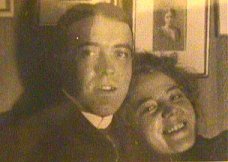 He appears to have been dissatisfied with both at the beginning of the
decade and ready to leave both at the end. According to the key letter
of Weston ERB was an extremely difficult husband with whom Emma had to
be patient. As Weston put it, no other woman would have put up with
his antics. Unfortunately he doesn't give details of those antics
but the indications are that Emma was a long suffering wife.
He appears to have been dissatisfied with both at the beginning of the
decade and ready to leave both at the end. According to the key letter
of Weston ERB was an extremely difficult husband with whom Emma had to
be patient. As Weston put it, no other woman would have put up with
his antics. Unfortunately he doesn't give details of those antics
but the indications are that Emma was a long suffering wife.
ERB's resentment of her apparently became an
abiding hatred. Danton Burroughs released information about ERB's
third great romance with a woman named Dorothy
Dahlberg during the war years of WWII through Robert Barrett the BB
staff writer in issue #64.
After having been estranged from her husband
for about a decade Emma died on 11/05/44, probably of a broken heart.
ERB returned to Los Angeles from Hawaii to dispose of her effects.
Arriving on 11/19/44 after visiting his daughter he met with Ralph Rothmund
in Tarzana where he proceeded to get soused, apparently in celebration
of Emma's death.
To quote Barrett, p.25, BB #64:
After Ed met with Ralph Rothmund, he
opened a case of Scotch and took out a bottle, after which he drove to
Emma's home in Bel-Air- where he and Jack "sampled the Scotch a couple
of times." From Bel-Air Jack drove Ed to the Oldknows, some friends
also in Bel-Air, where they continued to sample the Scotch. After this
visit Ed and Jack returned to Emma's home at 10452 Bellagio Road, where
Jack brought out a nearly full bottle of bourbon. Jack asked the
two maids to postpone dinner for 30 minutes, while they waited for Joan
and Joan II. This evidently irritated the two maids as they both
quit and walked out on them! Ed reported in his diary that after
the two maids walked out, "we had a lovely dinner and a grand time.
That sort of strikes me as dancing on the grave
of Emma which indicates a deep hatred for her on the part of ERB.
We are all familiar with the story of ERB's pouring the liquor in the swimming
pool humiliating Emma in front of guests which she stood so Weston must
have known what he was talking about.
There is a certain hypocrisy in Burroughs now
getting blotto in celebration of Emma's
death. Between the two of them in the space of a couple hours
ERB and his son, John Coleman, finished a fifth of Scotch and went ripping
through a bottle of bourbon. I don't how rough and tough you are
but that would have put me under the pool table.
In this inebriated and hostile state they apparently
had words with what I assume to have been Emma's long time maids.
Maids don't walk out because you ask them to hold dinner for a few minutes.
Being a maid is a job; they don't respond that way to reasonable requests.
So in his drunken state ERB must have been offensive about Emma or the
maids causing their reaction.
Thus sitting totally soused in the 'alcoholic'
Emma's home they 'had a lovely dinner and a grand time.' The woman
was both good to him and good for him but it isn't incumbent on any man
to see his best interests. There was a certain dignity lacking in
ERB's behavior at this good woman's death, not to mention the hypocrisy
of getting thoroughly jazzed.
d.
The decade also witnesses the unfolding of
ERB's psyche from the repressed and depressed state of 1910 to an expanded
and partially liberated state at the end of the decade when he fled Chicago.
Psychologically ERB was always a dependent
personality. He let his editors both magazine and book bully him
and take advantage of his good will.
He also always needed a strong role model which
is one reason his role models are so obvious.
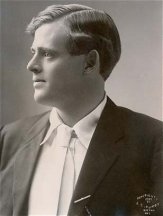 From 1911 to 1916 he seemed to lean on Jack
London as his role model. The problem with London is that we
can't be sure which of his books ERB read as he had none of his books in
his library. It seems certain that he read Call
Of The Wild and
The
Sea Wolf. His hobo information is probably based on London's
The
Road and then he may possibly have read The
Abysmal Brute which is concerned with the results of the Jack Johnson-Jim
Jeffries fight and a preliminary to Valley
Of The Moon. If he read the book before he wrote The
Mucker then it probably was an influence.
From 1911 to 1916 he seemed to lean on Jack
London as his role model. The problem with London is that we
can't be sure which of his books ERB read as he had none of his books in
his library. It seems certain that he read Call
Of The Wild and
The
Sea Wolf. His hobo information is probably based on London's
The
Road and then he may possibly have read The
Abysmal Brute which is concerned with the results of the Jack Johnson-Jim
Jeffries fight and a preliminary to Valley
Of The Moon. If he read the book before he wrote The
Mucker then it probably was an influence.
It is difficult to understand how Burroughs
could have read much during this decade what with his writing schedule
and hectic life style, yet we know for a fact that between 1913-15 he found
time to read Edward Gibbon's
massive The
Decline And Fall Of The Roman Empire.
At the same time additions to his library from
this decade are rather sparse, the bulk of the library seems to have been
purchased from 1920 on. Still, if one assumes that he read all the
books of London including 1913's Valley Of The Moon, then it is
possible that his cross-country drive of 1916 may have been partially inspired
by Billy and Saxon Roberts' walking tour of Northern California and Southern
Oregon in Valley Of The Moon as well as on ERB's hobo fixation.
Certainly London must have been his main hobo influence along with H.H.
Knibbs and Robert W. Service.
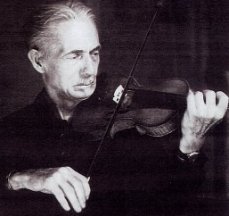
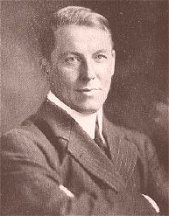
He may have wished to emulate London by owning a
large ranch.
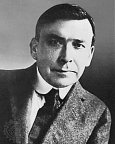 I suspect he meant to cal on London in Sonoma during his 1916 stay in California
but London died in the fall of that year which prevented the possible meeting.
With the loss of London Burroughs had to find another role model which
he did in Booth Tarkington. He does have a large number of Tarkington's
novels in his library, most of which were purchased in this decade.
Tarkington was also closely associated with Harry Leon Wilson who also
influenced ERB with a couple two or three novels in the library.
Just as a point of interest Harry Leon Wilson was also a friend of Jack
London.
I suspect he meant to cal on London in Sonoma during his 1916 stay in California
but London died in the fall of that year which prevented the possible meeting.
With the loss of London Burroughs had to find another role model which
he did in Booth Tarkington. He does have a large number of Tarkington's
novels in his library, most of which were purchased in this decade.
Tarkington was also closely associated with Harry Leon Wilson who also
influenced ERB with a couple two or three novels in the library.
Just as a point of interest Harry Leon Wilson was also a friend of Jack
London.
ERB's writing in the last years of the decade
seems to be heavily influenced by Tarkington as in Bridge And The Oskaloosa
Kid, The Efficiency Expert and The Girl From Hollywood.
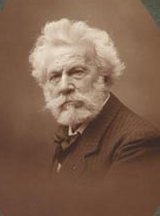 Burroughs was an avid reader and exceptionally well informed with a penetrating
mind so that his 'highly fictionalized' writing which seems so casual and
off hand is actually accurate beneath his fantastic use of his material.
While he used the speculations of Camille
Flammarion and possibly Lowell on the nature of Mars he was so mentally
agile that when better information appeared which made his previous speculations
untenable he had no difficulty in adjusting to the new reality. Not
everyone can do that.
Burroughs was an avid reader and exceptionally well informed with a penetrating
mind so that his 'highly fictionalized' writing which seems so casual and
off hand is actually accurate beneath his fantastic use of his material.
While he used the speculations of Camille
Flammarion and possibly Lowell on the nature of Mars he was so mentally
agile that when better information appeared which made his previous speculations
untenable he had no difficulty in adjusting to the new reality. Not
everyone can do that.
I have already mentioned his attention to the
ongoing friction between the US and Japan which appeared in the Samurai
of Billy Byrne's Pacific island. In this connection Abner Perry of
the Pellucidar series is probably named after Commodore Mathew Perry who
opened Japan in 1853. After all Abner Perry does build the fleet
that opened the Lural Az. Admiral Peary who reached the North Pole
is another possible influence. The identical pronunciation of both
names would have been serendipitous for Burroughs.
As no man writes in a vacuum the political
and social developments of his time had a profound influence on both himself
and his writing.
The effects of unlimited and unrestricted immigration
which had been decried by a small vocal minority for some time came to
a fruition in the Second Decade as the Great War showed how fragile the
assumed Americanization and loyalty of the immigrants was. The restriction
of immigration in 1920 must have been very gratifying to Burroughs.
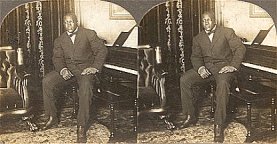 I have already indicated the profound reaction that Burroughs, London and
White America in general had to the success of the black Jack Johnson in
the pursuit of the heavyweight crown. The clouded restoration of
the crown through Jess Willard did little to alleviate the gloom.
Combined with the sinking of the Titanic and the course of the suicidal
Great War White confidence was irrevocably shaken.
I have already indicated the profound reaction that Burroughs, London and
White America in general had to the success of the black Jack Johnson in
the pursuit of the heavyweight crown. The clouded restoration of
the crown through Jess Willard did little to alleviate the gloom.
Combined with the sinking of the Titanic and the course of the suicidal
Great War White confidence was irrevocably shaken.
Burroughs shared with London the apprehension
that the old stock was losing its place of preeminence to the immigrants.
This fear would find its place in Burroughs writing where he could from
time to time make a nasty comment. His characterization of the Irish
is consistently negative while his dislike of the Germans first conceived
when he saw them as a young man marching through the streets of Chicago
under the red flag was intense. Their participation in the Haymarket
Riot combined with the horrendous reports of German atrocities during the
War reinforced his dislike almost to the point of fanaticism. While
the post-war German reaction to his writing was wrong he had given cause
for misinterpretation.
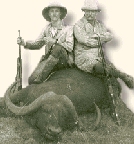 Always politically conservative he was a devoted admirer of Teddy Roosevelt
while equally detesting Woodrow Wilson who was President eight of the ten
years of the decade. When the Bolsheviks took over Russia in 1917
polarizing public opinion into the Left and the Right ERB was definitely
of the Right.
Always politically conservative he was a devoted admirer of Teddy Roosevelt
while equally detesting Woodrow Wilson who was President eight of the ten
years of the decade. When the Bolsheviks took over Russia in 1917
polarizing public opinion into the Left and the Right ERB was definitely
of the Right.
By the end of the decade the world he had known
from 1875 to 1920 had completely disappeared buried by a world of scientific
and technological advances as well as social and political changes that
would have been unimaginable in his earlier life. The changes in
sexual attitudes caused by among others Krafft-Ebbing, Havelock Ellis and
Margaret Sanger would have been astounding.
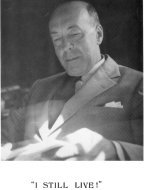 The horse had been displaced by the auto. Planes were overhead.
The movies already ruled over the stage, vaudeville and burlesque.
Cities had displaced the country. the Jazz Age which was the antithesis
of the manners and customs of 1875-1920 realized the new sexual mores so
that the Flapper and Red Hot Mama displaced the Gibson Girl as the model
of the New Woman.
The horse had been displaced by the auto. Planes were overhead.
The movies already ruled over the stage, vaudeville and burlesque.
Cities had displaced the country. the Jazz Age which was the antithesis
of the manners and customs of 1875-1920 realized the new sexual mores so
that the Flapper and Red Hot Mama displaced the Gibson Girl as the model
of the New Woman.
When ERB moved from Chicago to LA in
1919 he, like Alice, virtually stepped through the looking glass into a
world he never made - A Stranger In A Strange Land not too different in
many ways from the Mars of his imagination.
.

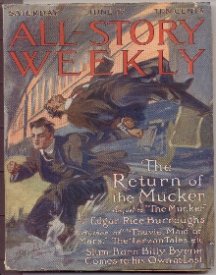
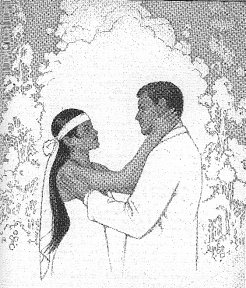
![]()



 Bearing in mind always that Weston's evaluation of Burroughs in his August
1934 letter in reply to Charles Rosenberg, whoever he was, about ERB's
divorce is one man's opinion nevertheless his statements can be corroborated
by ERB's behavior over this decade as well as throughout his life.
My intent is not to diminish ERB in any way. Nothing can take away
the fact that Burroughs created Tarzan, but like anyone else he was subjected
to glacial pressures which distorted and metaphosed his character.
Bearing in mind always that Weston's evaluation of Burroughs in his August
1934 letter in reply to Charles Rosenberg, whoever he was, about ERB's
divorce is one man's opinion nevertheless his statements can be corroborated
by ERB's behavior over this decade as well as throughout his life.
My intent is not to diminish ERB in any way. Nothing can take away
the fact that Burroughs created Tarzan, but like anyone else he was subjected
to glacial pressures which distorted and metaphosed his character.


 Perhaps the vanguard of the change came in 1919 when an event of great
literary and cultural import took place.
Perhaps the vanguard of the change came in 1919 when an event of great
literary and cultural import took place. 



 Just prior to his relationship with Florence he read a number of novels
by
Just prior to his relationship with Florence he read a number of novels
by  Burton apparently hit it big as the movies came after her. Flapper
Wife was made into a movie in 1926 titled
Burton apparently hit it big as the movies came after her. Flapper
Wife was made into a movie in 1926 titled  As a successful artist he was presented with challenges that had nothing
to do with his former life. These were all new challenges for which
he had no experience to guide him while he was too impetuous to sit down
and think them out properly. Not that all that many in his situation
do. Between magazine sales, book publishing and the movies he really
should have had a business manager as an intermediary. Perhaps Emma
might have been able to function in that capacity much as H.G. Wells'
wife, Jane, did for him. At any rate book and movie negotiations
diverted time and energy from his true purpose, writing.
As a successful artist he was presented with challenges that had nothing
to do with his former life. These were all new challenges for which
he had no experience to guide him while he was too impetuous to sit down
and think them out properly. Not that all that many in his situation
do. Between magazine sales, book publishing and the movies he really
should have had a business manager as an intermediary. Perhaps Emma
might have been able to function in that capacity much as H.G. Wells'
wife, Jane, did for him. At any rate book and movie negotiations
diverted time and energy from his true purpose, writing.
 He appears to have been dissatisfied with both at the beginning of the
decade and ready to leave both at the end. According to the key letter
of Weston ERB was an extremely difficult husband with whom Emma had to
be patient. As Weston put it, no other woman would have put up with
his antics. Unfortunately he doesn't give details of those antics
but the indications are that Emma was a long suffering wife.
He appears to have been dissatisfied with both at the beginning of the
decade and ready to leave both at the end. According to the key letter
of Weston ERB was an extremely difficult husband with whom Emma had to
be patient. As Weston put it, no other woman would have put up with
his antics. Unfortunately he doesn't give details of those antics
but the indications are that Emma was a long suffering wife.
 From 1911 to 1916 he seemed to lean on
From 1911 to 1916 he seemed to lean on 

 I suspect he meant to cal on London in Sonoma during his 1916 stay in California
but London died in the fall of that year which prevented the possible meeting.
With the loss of London Burroughs had to find another role model which
he did in Booth Tarkington. He does have a large number of Tarkington's
novels in his library, most of which were purchased in this decade.
Tarkington was also closely associated with Harry Leon Wilson who also
influenced ERB with a couple two or three novels in the library.
Just as a point of interest Harry Leon Wilson was also a friend of Jack
London.
I suspect he meant to cal on London in Sonoma during his 1916 stay in California
but London died in the fall of that year which prevented the possible meeting.
With the loss of London Burroughs had to find another role model which
he did in Booth Tarkington. He does have a large number of Tarkington's
novels in his library, most of which were purchased in this decade.
Tarkington was also closely associated with Harry Leon Wilson who also
influenced ERB with a couple two or three novels in the library.
Just as a point of interest Harry Leon Wilson was also a friend of Jack
London.
 Burroughs was an avid reader and exceptionally well informed with a penetrating
mind so that his 'highly fictionalized' writing which seems so casual and
off hand is actually accurate beneath his fantastic use of his material.
While he used the speculations of
Burroughs was an avid reader and exceptionally well informed with a penetrating
mind so that his 'highly fictionalized' writing which seems so casual and
off hand is actually accurate beneath his fantastic use of his material.
While he used the speculations of  I have already indicated the profound reaction that Burroughs, London and
White America in general had to the success of the black Jack Johnson in
the pursuit of the heavyweight crown. The clouded restoration of
the crown through Jess Willard did little to alleviate the gloom.
Combined with the sinking of the Titanic and the course of the suicidal
Great War White confidence was irrevocably shaken.
I have already indicated the profound reaction that Burroughs, London and
White America in general had to the success of the black Jack Johnson in
the pursuit of the heavyweight crown. The clouded restoration of
the crown through Jess Willard did little to alleviate the gloom.
Combined with the sinking of the Titanic and the course of the suicidal
Great War White confidence was irrevocably shaken.
 Always politically conservative he was a devoted admirer of Teddy Roosevelt
while equally detesting Woodrow Wilson who was President eight of the ten
years of the decade. When the Bolsheviks took over Russia in 1917
polarizing public opinion into the Left and the Right ERB was definitely
of the Right.
Always politically conservative he was a devoted admirer of Teddy Roosevelt
while equally detesting Woodrow Wilson who was President eight of the ten
years of the decade. When the Bolsheviks took over Russia in 1917
polarizing public opinion into the Left and the Right ERB was definitely
of the Right.
 The horse had been displaced by the auto. Planes were overhead.
The movies already ruled over the stage, vaudeville and burlesque.
Cities had displaced the country. the Jazz Age which was the antithesis
of the manners and customs of 1875-1920 realized the new sexual mores so
that the Flapper and Red Hot Mama displaced the Gibson Girl as the model
of the New Woman.
The horse had been displaced by the auto. Planes were overhead.
The movies already ruled over the stage, vaudeville and burlesque.
Cities had displaced the country. the Jazz Age which was the antithesis
of the manners and customs of 1875-1920 realized the new sexual mores so
that the Flapper and Red Hot Mama displaced the Gibson Girl as the model
of the New Woman.

